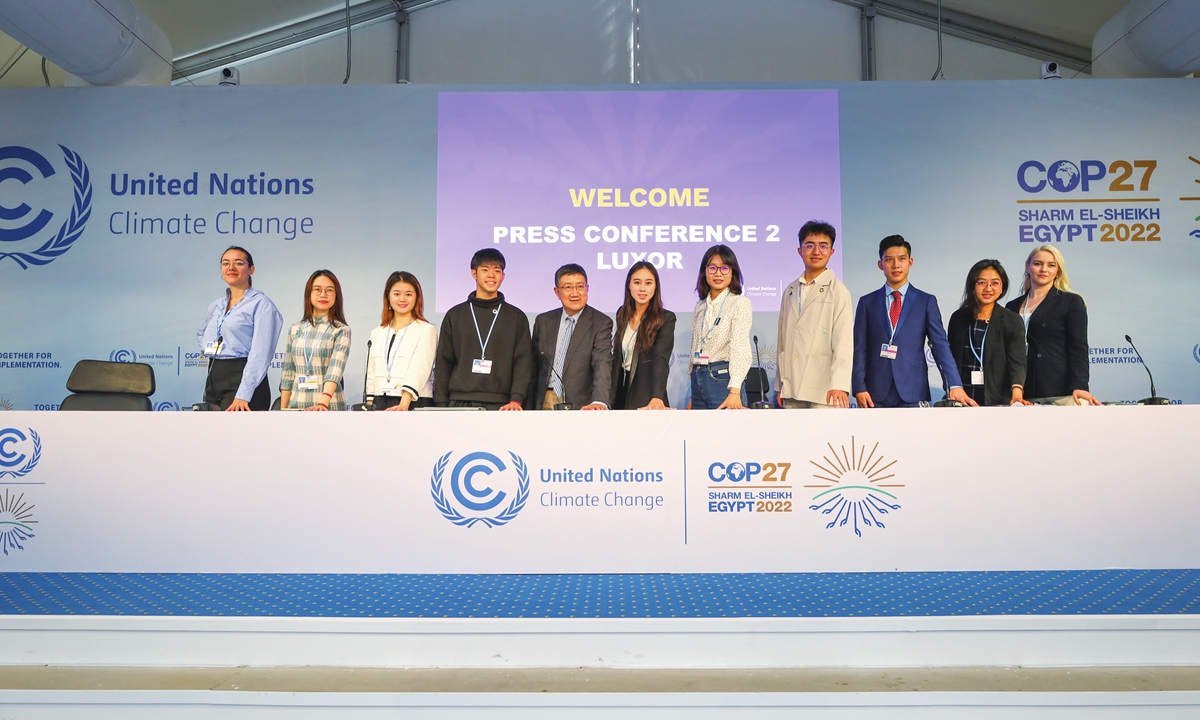IN-DEPTH / IN-DEPTH
Young Chinese hydro-eco student makes Gen-Zers' voice heard at COP27
Editor's Note:
Young Chinese people in the new era are confident, aspirational, and responsible. With a global vision, they stand at the forefront of the times ready to fully commit to a more global outlook. Chinese people accept and quickly respond to the world's trending schools of thought. Some members of China's Generation Z have begun to practice the tenets of their "global citizen" identity and use their actions to influence the society.
The Global Times has therefore launched a series of introductory stories on China's Gen Zers who are interested in different global topics, such as environmental protection, equality, and employment issues, and invites them to share their stories, sentiments and ideas.
Recently, we spoke with two excellent Chinese students who care about climate change and just returned from the recently concluded 27th session of the Conference of the Parties of the UNFCCC (COP27) in Sharm el Sheikh, Egypt. They, representing the young generation, made their voices heard while gaining experience and honing their leadership skills by engaging with their communities and driving climate actions.

In recent years, Wang Xinlu has voyaged on the Jinsha River to collect water samples and guage water quality.
The river passes through some regions in Southwest China that have not been subjected to human exploitation. Wang treasures the good feeling of floating on the peaceful water and surrounded by the pure natural sceneries there.
Wang is a PhD student studying Hydro-environmental Engineering at Tsinghua University. Her research focuses on exploring hydro-eco mechanisms and the impact of large-scale hydropower construction on the Yangtze River of China.
"River ecological protection and climate change are also closely related, especially when we see the impact of the current climate extremes, many of which, in fact, are caused by climate change," Wang told the Global Times.
She is passionate about sustainable development, climate action, international governance, and collaborative solutions to these issues. With her knowledge in hydrology and ecology, she focuses on extreme hydrological events in terms of climate change and hopes to find better solutions.
This month, Wang went to Egypt as part of the COP27 Youth Delegates with the Global Alliance of Universities on Climate (GAUC) China delegation, which is initiated by top universities in the world including Tsinghua, aiming to advance climate change solutions through research, education, and public outreach.
There, Wang and her peers made their voices heard and gained vital experience which will help them in the future deal with climate issues.
Voices for the new generation
Majored in water conservancy, Wang had the opportunity to visit several hydropower stations at home and abroad and to learn about how these constructions are combined with local ecosystems.
"The hydropower projects proposed and constructed under Belt and Road Initiatives (BRI) are technologically sound," she said. "It is also an important part of the the topic of adaptation in confronting climate change, that is to financially and technologically aid less-developed countries, to help them counter the effects of climate disasters," she explained.
In 2019 she completed a climate change-related internship and this year, she started a climate change course at GAUC, which also affored her the opportunity to attend the COP27.
At the aspirational event, the youth ambassadors from different countries released an open letter directed to world leaders at the "Climate x" event in the China Pavilion on November 9.
Global climate leaders including Xie Zhenhua, China's special envoy on climate change, also attended the event. "Now is the time to encourage more young people to join this movement and put forward innovative solutions," he said at the event.
Wang and her peers also presented the letter to Inger Andersen, Under-Secretary-General of the United Nations and Executive Director of the United Nations Environment Programme.
"I feel lucky to be able to show our young people's actions and commitment to world leaders with this letter," she said. "Our young people are very positive and willing to promote the awareness on climate change. I hope that other attendees of the COP27 were able to feel the passion of young people," she said.

Today, the youth are increasingly aware that the climate crisis presents challenges and risks, and that addressing climate change presents opportunities for sustainable development, according to the UN.
"In ongoing negotiations, each country just seeks its own benefit with numerous clashes. But a variety of interests and goals need to be dealt together to solve climate issues," Wang said.
"Young people will become the decision makers on climate change issues in the future. The COP27 and organizations like GAUC have provided us with an opportunity to build up connections and mutual trust," she said.
Seeing improvements
Wang was born in Weihai, East China's Shandong Province, which is a coastal city.
"I feel that I have a natural intimacy with the ocean, so I have paid extra attention to the marine environment since I was a child, especially after I went to college. This is also one of the reasons that led me to focus more on climate change," she said.
When Wang first started at Tsinghua in 2016, it was a time when northern China was impacted by severe smog. "In winter, we often needed to wear face masks," she said.
"But after some years, air quality in Beijing has greatly improved. It means if we acted, there would be changes, even in bigger issues such as the climate change," she said.
In Wang's opinion, in dealing with environment and climate issues, China is "more inclined to action." "China formulates climate policies based on its own national conditions and has always promoted the achievement of such goals," she said.
Thanks to China's persistent efforts to combat all types of pollution, clear waters and blue skies are becoming more common across the country.
Air quality has improved notably, with the average concentration of PM2.5 hazardous airborne particles decreasing from 46 micrograms per cubic meter in 2015 to 30 micrograms per cubic meter in 2021, according to the Ministry of Ecology and Environment, the Xinhua News Agency reported in September.
Young Chinese people in the new era are confident, aspirational, and responsible. With a global vision, they stand at the forefront of the times ready to fully commit to a more global outlook. Chinese people accept and quickly respond to the world's trending schools of thought. Some members of China's Generation Z have begun to practice the tenets of their "global citizen" identity and use their actions to influence the society.
The Global Times has therefore launched a series of introductory stories on China's Gen Zers who are interested in different global topics, such as environmental protection, equality, and employment issues, and invites them to share their stories, sentiments and ideas.
Recently, we spoke with two excellent Chinese students who care about climate change and just returned from the recently concluded 27th session of the Conference of the Parties of the UNFCCC (COP27) in Sharm el Sheikh, Egypt. They, representing the young generation, made their voices heard while gaining experience and honing their leadership skills by engaging with their communities and driving climate actions.

Wang Xinlu at the COP27 Photo: Courtesy of Wang
In recent years, Wang Xinlu has voyaged on the Jinsha River to collect water samples and guage water quality.
The river passes through some regions in Southwest China that have not been subjected to human exploitation. Wang treasures the good feeling of floating on the peaceful water and surrounded by the pure natural sceneries there.
Wang is a PhD student studying Hydro-environmental Engineering at Tsinghua University. Her research focuses on exploring hydro-eco mechanisms and the impact of large-scale hydropower construction on the Yangtze River of China.
"River ecological protection and climate change are also closely related, especially when we see the impact of the current climate extremes, many of which, in fact, are caused by climate change," Wang told the Global Times.
She is passionate about sustainable development, climate action, international governance, and collaborative solutions to these issues. With her knowledge in hydrology and ecology, she focuses on extreme hydrological events in terms of climate change and hopes to find better solutions.
This month, Wang went to Egypt as part of the COP27 Youth Delegates with the Global Alliance of Universities on Climate (GAUC) China delegation, which is initiated by top universities in the world including Tsinghua, aiming to advance climate change solutions through research, education, and public outreach.
There, Wang and her peers made their voices heard and gained vital experience which will help them in the future deal with climate issues.
Voices for the new generation
Majored in water conservancy, Wang had the opportunity to visit several hydropower stations at home and abroad and to learn about how these constructions are combined with local ecosystems.
"The hydropower projects proposed and constructed under Belt and Road Initiatives (BRI) are technologically sound," she said. "It is also an important part of the the topic of adaptation in confronting climate change, that is to financially and technologically aid less-developed countries, to help them counter the effects of climate disasters," she explained.
In 2019 she completed a climate change-related internship and this year, she started a climate change course at GAUC, which also affored her the opportunity to attend the COP27.
At the aspirational event, the youth ambassadors from different countries released an open letter directed to world leaders at the "Climate x" event in the China Pavilion on November 9.
Global climate leaders including Xie Zhenhua, China's special envoy on climate change, also attended the event. "Now is the time to encourage more young people to join this movement and put forward innovative solutions," he said at the event.
Wang and her peers also presented the letter to Inger Andersen, Under-Secretary-General of the United Nations and Executive Director of the United Nations Environment Programme.
"I feel lucky to be able to show our young people's actions and commitment to world leaders with this letter," she said. "Our young people are very positive and willing to promote the awareness on climate change. I hope that other attendees of the COP27 were able to feel the passion of young people," she said.

The Global Alliance of Universities on Climate (GAUC) youth delegation at the COP27 on November 7, 2022 Photo: Courtesy of GAUC
Today, the youth are increasingly aware that the climate crisis presents challenges and risks, and that addressing climate change presents opportunities for sustainable development, according to the UN.
"In ongoing negotiations, each country just seeks its own benefit with numerous clashes. But a variety of interests and goals need to be dealt together to solve climate issues," Wang said.
"Young people will become the decision makers on climate change issues in the future. The COP27 and organizations like GAUC have provided us with an opportunity to build up connections and mutual trust," she said.
Seeing improvements
Wang was born in Weihai, East China's Shandong Province, which is a coastal city.
"I feel that I have a natural intimacy with the ocean, so I have paid extra attention to the marine environment since I was a child, especially after I went to college. This is also one of the reasons that led me to focus more on climate change," she said.
When Wang first started at Tsinghua in 2016, it was a time when northern China was impacted by severe smog. "In winter, we often needed to wear face masks," she said.
"But after some years, air quality in Beijing has greatly improved. It means if we acted, there would be changes, even in bigger issues such as the climate change," she said.
In Wang's opinion, in dealing with environment and climate issues, China is "more inclined to action." "China formulates climate policies based on its own national conditions and has always promoted the achievement of such goals," she said.
Thanks to China's persistent efforts to combat all types of pollution, clear waters and blue skies are becoming more common across the country.
Air quality has improved notably, with the average concentration of PM2.5 hazardous airborne particles decreasing from 46 micrograms per cubic meter in 2015 to 30 micrograms per cubic meter in 2021, according to the Ministry of Ecology and Environment, the Xinhua News Agency reported in September.




